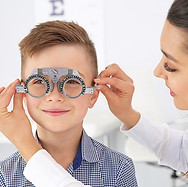
What is Myopia?
Myopia, also known as short-sightedness, is a common vision condition that affects many people worldwide. It occurs when the eye is unable to focus light correctly, resulting in blurred distance vision. If you are experiencing symptoms of myopia, such as difficulty seeing objects far away, it is important to schedule an eye exam with your optometrist to determine the best course of treatment.
How can Myopia be managed?

Methods that have gained support in the control of myopia:
-
MiyoSmart lenses in spectacles, enable focus in both the central and mid-peripheral vision.
-
Orthokeratology (Ortho-K) involves the use of individually designed contact lenses that gently mould the shape of the cornea.
-
Soft daily disposable contact lenses that are specifically designed to have a myopia-controlling effect.
-
Eyedrops with Atropine. Low-dose atropine eyedrops can be used to slow the progression of myopia with minimal side effects.
When, and how often is an eye test required for Myopia control?
Myopia progression can be slowed or halted in children and teenagers. Regular eye tests for your children are recommended from at least 4 years of age, or earlier if you have concerns.
For all eye tests, you can book online through our website.

Should I be concerned about Myopia and it's risks to my child's vision?
Myopia is becoming more common in children around the world – the prevalence among Australian 12-year-olds doubled between 2005 and 2011 (source: https://www.mykidsvision.org/en-us). The increased use of electronic devices by children, and less outdoor activities, are all contributing to this trend.
Myopia in kids tends to progress or develop throughout childhood. Higher levels of myopia are associated with higher eye disease risks in adulthood. If your child already wears contact lenses or glasses, you can do something to stop their vision worsening. If they currently don't require any vision correction, you can assess their risk of developing myopia
Is increasing Myopia a risk?
Yes, increasing myopia is a concern for optometrists. Myopia can lead to a higher risk of diseases such as glaucoma, cataracts, myopia macular degeneration and retinal detachment. These increased risks are even greater for higher levels of myopia, > -6.00. Excessive eye length is often associated with higher levels of myopia and research has shown that eyes that are significantly longer than normal have a 27% chance of permanent visual impairment by the age of 75.
The higher the level of myopia, the higher the risk of vision loss.

